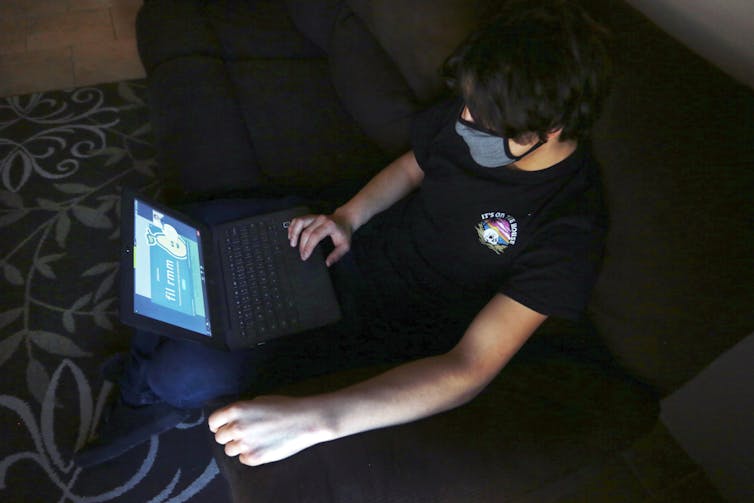You're not imagining it – 3 ways COVID-19 has been extra hard on American parents
- Written by Steven Greene, Professor of Political Science, North Carolina State University
For over a year, Americans have been struggling with the challenges imposed on them by the global coronavirus pandemic. While all Americans have struggled, the pandemic has imposed three distinctive sets of burdens on the 64 million Americans living with children[1] under the age of 18.
As those who have children know firsthand, becoming a parent is a life-changing, challenging, long-term experience. Even before the pandemic, surveys showed that a majority of parents[2] were struggling to balance[3] their work demands and their desire to spend quality time with their children.
Since March 2020, however, parents have had to negotiate their own workplace demands and other responsibilities with around-the-clock child care responsibilities. They have been spending hours every day helping their children navigate remote and hybrid schooling, while also taking on increased household tasks, like preparing multiple meals a day and cleaning more often because everyone is at home.
Stories in the news media have profiled specific families[4] to illustrate powerfully how already overstretched parents are now taking on many more time-consuming responsibilities[5]. Many parents feel they are failing to be good parents[6] and not able to do their paying jobs well. In some cases, parents have had to leave their jobs[7] to care for their children, even though this undermines their family’s financial security.
Profiles of specific families are eye-opening, but as social science researchers with extensive expertise in the American family[8], we looked at the broader picture. We have found that these anecdotes are indeed supported by nationally representative empirical data: This pandemic year has been harder for parents than almost anyone else, in terms of finances, physical health and mental health.
Finances and health
Life has been extra tough for parents in three specific ways, as shown in our analysis of national data on pandemic experiences, the UNC Covid Panel Study Wave 3, published in Social Science Quarterly[9].
People who are parents are more likely than those who do not have children to report losing their job during the pandemic. Parents are also more likely than those without children to report having experienced a worsening financial situation over the past year.
Parents are also more likely than those without children to report having had COVID-19. Why exactly this is the case is a question better answered by epidemiologists than by social scientists. But it seems plausible that the demands of parenthood are increasing parents’ risk.
When parents have to work outside the home to support their families, they must rely on others to care for their children. That means using day care, finding in-person schooling, paying a caregiver, or relying on friends and family. All of that is normal in nonpandemic times, but in a pandemic, every one of those options means expanding the pool of interpersonal contacts, increasing parents’ risk.
Fear was a constant factor this past year, for nearly everyone – but our research shows parents were more fearful and viewed COVID-19 as more of a threat than those without children. This finding is consistent with other research[10] showing that parents, understandably, have a very strong desire to keep their children safe and that the act of caring for a child or children intensifies fears about possible threats[11].
The survey data used in our research also included questions about mental health. Respondents were asked how often they have been bothered by feeling down, depressed or hopeless; feeling nervous, anxious or on edge; and not being able to stop worrying or control their worrying.
Parents were more likely than those without children to report experiencing these problems. Mothers were the most likely to indicate that they were depressed, anxious and worried – but fathers were also more likely to report these negative feelings than were men without kids.
 Schools that went to remote learning put additional pressure on parents.
AP Photo/Cedar Attanasio[12]
Schools that went to remote learning put additional pressure on parents.
AP Photo/Cedar Attanasio[12]
School-related stress
Beyond these three major categories of problems, schooling decisions added to the strain on parents. Despite parents’ economic and psychological strain, just 14% of the survey respondents supported a return to fully in-person school for their children.
Surveyed early in the 2020-21 school year, the plurality of parents, 49%, supported online learning, and 37% supported a hybrid option, which inherently increases in-person contact and therefore the potential for disease to spread. Caught between a need to do their jobs to support their families and critical concerns about the health and safety of their children, parents are in many ways in an impossible situation.
[Get facts about coronavirus and the latest research. Sign up for The Conversation’s newsletter.[13]]
While the data in and of itself does not offer solutions to the significant toll of the pandemic on parents, it does show that the problems faced by parents are real. Parents who have been feeling overwhelmed over the past year should know that they are not alone. The challenges of parenting during the pandemic are real and widespread.
References
- ^ 64 million Americans living with children (www.census.gov)
- ^ majority of parents (www.pewresearch.org)
- ^ struggling to balance (www.pewresearch.org)
- ^ have profiled specific families (www.nytimes.com)
- ^ time-consuming responsibilities (www.nytimes.com)
- ^ failing to be good parents (www.pbs.org)
- ^ leave their jobs (www.washingtonpost.com)
- ^ expertise in the American family (www.sunypress.edu)
- ^ published in Social Science Quarterly (doi.org)
- ^ other research (doi.org)
- ^ intensifies fears about possible threats (doi.org)
- ^ AP Photo/Cedar Attanasio (newsroom.ap.org)
- ^ Sign up for The Conversation’s newsletter. (theconversation.com)
Authors: Steven Greene, Professor of Political Science, North Carolina State University

